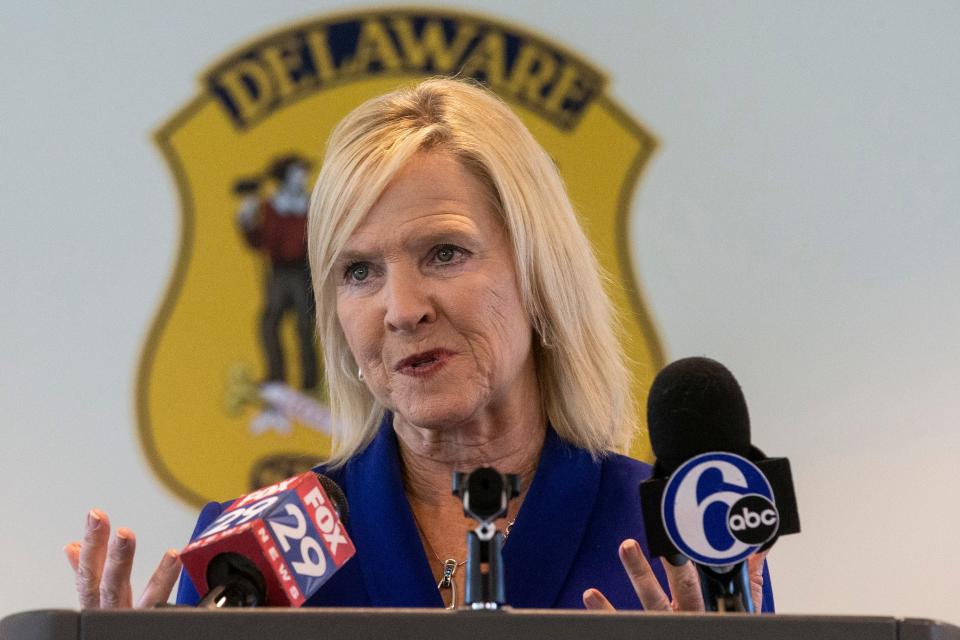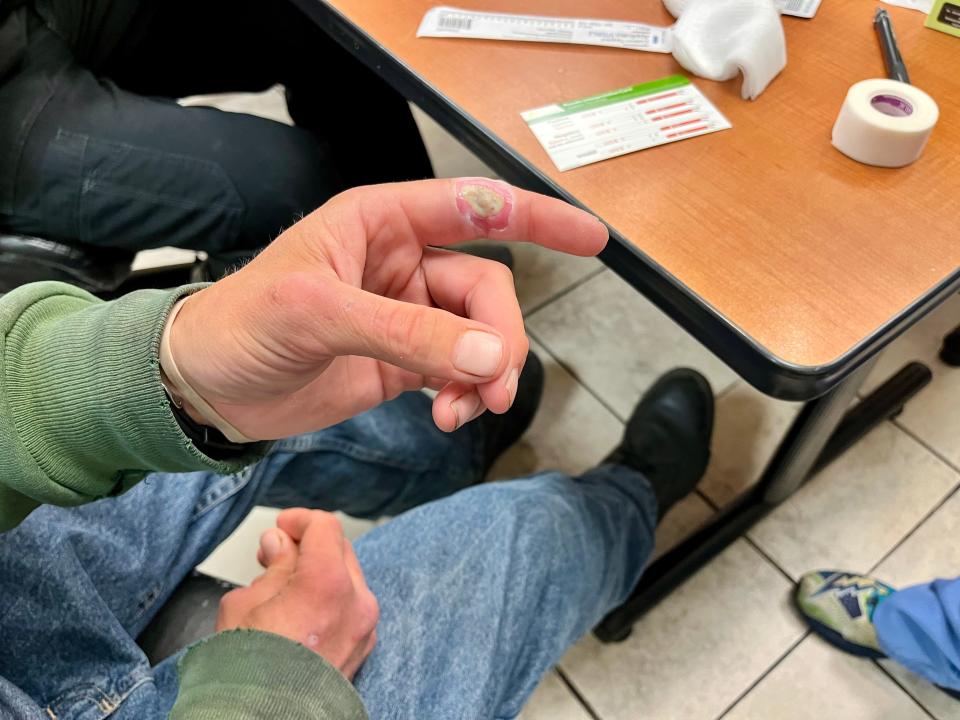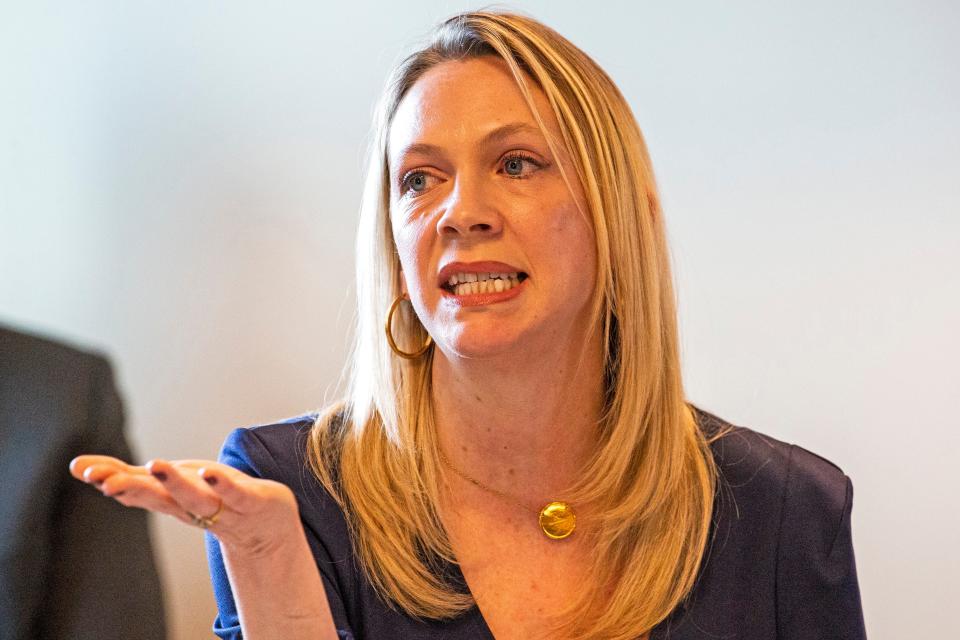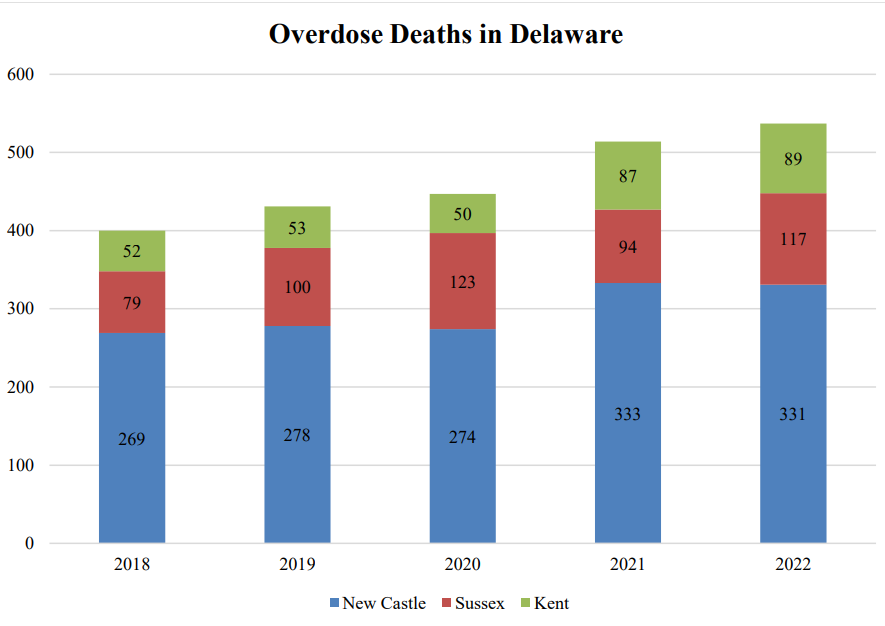$10M is on its way to Delaware organizations tackling the opioid crisis. Is it enough?
The Prescription Opioid Settlement Distribution Commission opened its July 10 meeting with a grim statistic: That week, at least 17 Delawareans died from drug overdoses.
But as Lt. Gov. Bethany Hall-Long began to go through the meeting’s agenda, it was with the knowledge that the commission had the ability to once again bolster the state’s response to the ever-worsening crisis through a new round of grants.
The state reported that 136 organizations applied for the money, with their requests totaling over $74.3 million. A review process narrowed the recipients to just 46 that the committee determined could have the greatest impact.
The selected organizations said they needed more than $21.2 million to fund their work. But the commission had only $10 million to give.

OPIOID CRISIS: From patent to Percocet: How this powerful opioid got its start in Delaware
The money comes from settlements with major drug manufacturers and distributors like Purdue Pharma, Walgreens and Endo Pharmaceutical for their misleading marketing and over-prescription of addictive painkillers, which experts consider the impetus of the current nationwide crisis.
Many states have similar commissions set up to allocate settlement funds to address the issues and reduce the harm of the opioid epidemic. Delaware — which consistently has one of the highest overdose rates in the nation — was one of the first states to begin actually allocating their funds.
The current round of grant recipients represent businesses and nonprofits statewide, with the majority of county-specific services focused in New Castle. Awardees ranged from state-sponsored programs like the Division of Substance Abuse and Mental Health to nonprofits like atTAcK Addiction and the Food Bank of Delaware.
All of these organizations have pledged to use the money on efforts related to harm reduction, recovery support, treatment or prevention and awareness campaigns.
How were the recipients chosen?
The Prescription Opioid Settlement Distribution Commission's executive director, Susan Holloway, said 38 applications were disqualified off the bat, with most lacking the required business license. Others did not fill out the application properly or include all the necessary information.
She said she recognized that not all organizations have the means or experience to effectively write a grant application, a point that advocates and commission members raised concerns over.
To address this gap, Holloway said that the commission hosted virtual information sessions on how to apply and offered one-on-one help filling out the applications. And though some potential applicants did not know about the assistance — or the application process in general — the commission said they are welcome to apply for the next round of grants.
Of the grants that were considered, Holloway said they were reviewed using the Johns Hopkins Evidence-Based Practice model, a guide to making informed and effective decisions in health care.
ALCOHOL: The legal side of substance use disorder: How Delaware helps people misusing alcohol
She said there are five key parts to implementing the model when it comes to the opioid crisis: The money must be used to save lives, invested in youth prevention, focused on racial equity, guided by evidence and transparently divided.
In some cases, only part of the grant was approved, often because the other proposed uses for the funding were already adequately covered by other organizations. This allowed more organizations to get funding and better fill in the gaps in coverage.

Holloway pointed to Addiction Recovery Systems in New Castle County, which originally applied for over $1 million in grant funds. While the organization does important work in areas such as counseling and medication-assisted treatment, Holloway said the county is already saturated with those services.
But one of the services outlined in Addiction Recovery Systems’ application would fill an ever-widening gap in opioid use disorder treatment and harm reduction: a wound care clinic.
WOUND CARE: 'Tranq dope' is becoming more prevalent in Delaware. Can this outreach help?
The necessity of these clinics has increased rapidly as xylazine — also known as “tranq” — spreads across the First State. The animal tranquilizer, which is often mixed with fentanyl, causes lesions in the skin that can become infected if left untreated.
It’s yet another reason why funding addiction outreach and treatment is more critical than ever before, Hall-Long said.
Widening impact
After the list of proposed grant recipients was approved by the Prescription Opioid Settlement Distribution Commission, it was brought to a vote before the Behavioral Health Consortium.
All but one of the consortium members in attendance voted to approve the proposed grants.
Republican Sen. Eric Buckson wrote in the Zoom chat that while he supports the settlement funds being given out and the work being done, he did not feel it was fair that fewer Kent County- and Sussex County-specific programs were awarded grants.
While addiction resources downstate have historically been less available than those based in New Castle County — not to mention rising overdose rates in more rural areas — Hall-Long emphasized that many of the grant recipients will use the funds for programming statewide.
HARM REDUCTION: Why Delaware believes schools, parents are key to preventing more overdoses among kids
Sixteen of the 38 grants awarded are designated as working statewide, totaling about $4.16 million.
The second-largest grant — a total of $500,000 — was also awarded to a Kent County-specific initiative aimed at expanding Code Purple in the area.
The largest grant was awarded to DSAMH to fund its Prescription Opioid Impact Fee scholarship program, which helps Delawareans recovering from addiction pay for transportation, food, health care, child support and, perhaps most importantly, housing.
The program was previously paused in late April after funds ran out, leaving advocates scrambling to fill the gaps in care to ensure no one would end up without a roof over their head.
MORE: Activists work to fill gaps after substance abuse scholarship fund runs out
Members of the Behavioral Health Consortium also expressed concerns over the grant slated to be awarded to Our Youth Inc. to pay for housing in Wilmington for people transitioning out of inpatient treatment.
The nonprofit, which was created by former Wilmington City Council member Norman Oliver, is under scrutiny for receiving grants from Oliver’s sister Zanthia, who is on the City Council.
Consortium members agreed that they would wait to give the money to Our Youth Inc. until the situation was resolved by the Delaware Department of Justice and Office of Management and Budget, though some attendees pointed out that the decision would prevent the $450,000 awarded to the business from being used by other grant applicants to help people in the meantime.
BACKGROUND: Why Wilmington City Council declined to censure one of its own over ethics violation
Distribution of funds to the other selected organizations has already begun.
Advancing equity in the fight to end addiction
The Prescription Opioid Settlement Distribution Commission was not the only state body awarding grants to help tackle the addiction crisis in July.
Eight local organizations were selected by DSAMH to receive up to $50,000 in mini-grants as part of the division’s new Health Equity Advancement Project, which aims to bolster efforts to collect more data on substance use disorder in minority communities and implement culturally specific engagement strategies.
Reports from the Division of Forensic Science show that overdoses are climbing at unprecedented rates in the Black community, rising by almost 21% in 2022. Black Delawareans now account for at least 29% of reported fatal overdoses in the state.
REPORTS: 2022 overdose deaths follow troubling pattern as state, advocates struggle to catch up

“Rather than the state coming in and trying to impose a framework, we really wanted to invite some of the nontraditional partners who may not be eligible for some of the larger grants to be able to participate in this and be part of the conversation,” DSAMH Director Joanna Champney said.
Equity was also raised as an issue in the meetings leading up to the final approval of opioid settlement fund grants, with some calling into question why seemingly larger organizations like ChristianaCare were awarded grants over smaller community-based ones.
Some of the organizations that were denied grants from the settlement fund were approved for the DSAMH mini-grant, though for a considerably smaller sum of money. These grant recipients also represented a larger swath of community advocates and organizations – ones that can often reach populations that bigger, more established organizations can’t.
The grant recipients included everyone from a physical therapy and wellness center in Middletown to the National Pan-Hellenic Council of New Castle County. Each organization opens new avenues for communicating with often underserved demographics, Champney said, and gathers information about community needs that the state has historically struggled to reach.
RECOVERY: How a Delaware farm aims to help parenting, pregnant women recover from addiction

Beyond providing a more accurate measure of substance use in minority communities, Champney said she hopes that the funding will empower these organizations – including grassroots ones – to help people in need overcome barriers to treatment.
“They’re a trusted messenger,” Champney said. “So (these organizations) going to their membership to have these critical conversations changes the paradigm from the state trying to solve the problem to enlisting help.”
The mini-grants will expire in September, at which point recipients will present their findings and progress at a Health Equity Summit. Champney said DSAMH hopes to continue to work with the organizations – as well as the seven that applied but were not selected – going forward.
“We're in this together,” Champney said, “and we need all hands on deck to figure out what we're going to do to change these really startling statistics.”
How to find help
Delaware Hope Line: 833-9-HOPEDE for free 24/7 counseling, coaching and support, as well as links to mental health, addiction and crisis services. Resources also can be found on the Help is Here website.
Suicide and Crisis Lifeline: 988
SAMHSA National Helpline: 800-662-HELP (4357) for free 24/7 substance abuse disorder treatment referral services. Treatment service locators also are available online at findtreatment.samhsa.gov or via text message by sending your ZIP code to 435748.
Send story tips or ideas to Hannah Edelman at [email protected]. For more reporting, follow them on Twitter at @h_edelman.
This article originally appeared on Delaware News Journal: Delaware addiction services get boost with $10M in settlement grants